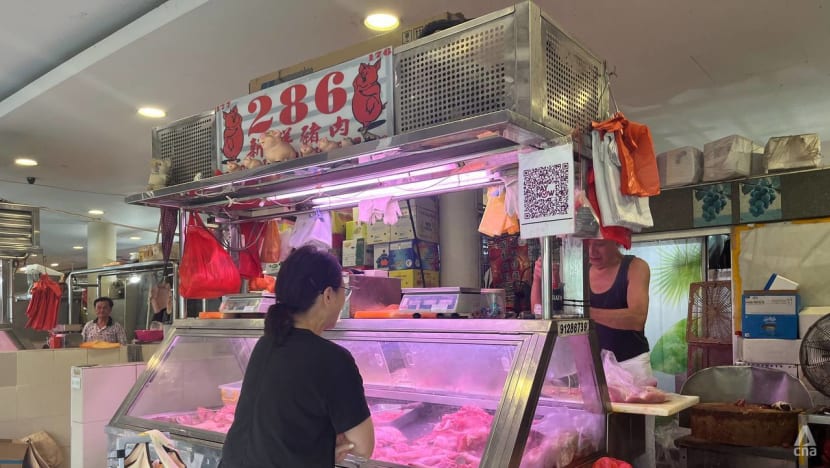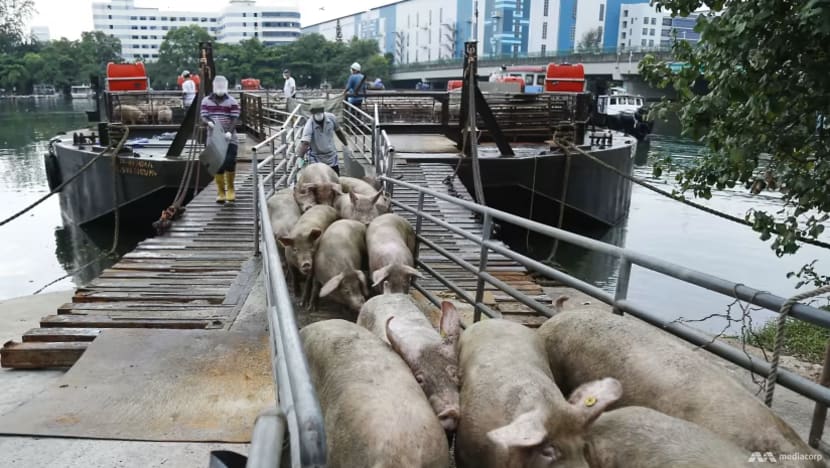Fresh pork back on sale in Singapore’s wet markets, but prices have gone up
Some pork sellers said they have had to pay about 30 per cent more for the new stock from Sarawak, and the higher costs will be passed down to customers.

Pork sellers at Tiong Bahru Wet Market said they have had to pay about 30 per cent more for the new stock from Sarawak, and the higher costs will be passed down to customers. (PHOTO: CLARA LEE/CNA)
SINGAPORE: Fresh pork is back on sale in Singapore’s wet markets, but they carry a heftier price tag.
The first round of freshly slaughtered pork from Malaysia was distributed to local wet markets from Wednesday (May 3), a day after hitting supermarkets.
The supply of fresh pork suffered a temporary disruption starting Apr 23 as the Singapore Food Agency (SFA) halted imports from Pulau Bulan in Indonesia. This was after African swine fever was detected in some pig carcasses from a consignment of livestock.
SFA has worked with the abattoir, which was forced to close for cleaning, to sanitise the premises and surrounding environment.
On Tuesday, Senior Minister of State for Sustainability and the Environment Koh Poh Koon said that operations at the local abattoir have resumed with shipments of live pigs from Sarawak in Malaysia.
PASSING DOWN HIGHER COSTS TO CUSTOMERS
Pork sellers at Tiong Bahru Wet Market said they have had to pay about 30 per cent more for the new stock from Sarawak, and the higher costs will be passed down to customers.
Mr Sunny Lee, owner of a fresh pork stall at Tiong Bahru Wet Market, said: “Only they have the stock, and if they quote you a price and you don’t take it, there’s nowhere else for us to go. We have no choice.”
Some pork sellers said it could take at least four months before live pig imports from Indonesia resume.
But they added that the stock from Malaysia is only a temporary solution for them.

“I hope that the live pigs will come from Indonesia soon, because the customers prefer that,” said Ms Mary Cheong, who also runs a fresh pork stall at the same wet market.
The higher prices have, however, not stopped customers from joining long queues for the fresh pork.
"I probably used to pay around $50 for the same amount in the past. But today, I had to pay maybe about 50 per cent more,” said one customer. “I didn't realise it was so expensive.”
Another customer said: “I don't think it's much of an issue. I can buy some to freeze at home, and store them for another one to two months.”
DIVERSIFICATION REMAINS KEY FOOD SECURITY STRATEGY
Live pigs from Pulau Bulan make up about 15 per cent of Singapore's total pork supply. This makes up about two-thirds of the country's supply of freshly slaughtered pork.
But the country's pork supply is “well diversified” with more than 20 sources, said SFA last month. These include live pigs from Sarawak and chilled or frozen pork from Australia, Brazil, Denmark and New Zealand.
Diversification remains a key food security strategy for Singapore, said the agency. This reduces the impact of disruption from any single source, as importers can turn to alternative sources quickly to stabilise the country’s food supply.
"Food supply disruptions can occur from time to time. Consumers are encouraged to be flexible and adaptable with our choice of food," the agency said.
Investigations at the Pulau Bulan farm are ongoing, said Dr Koh, thanking stallholders for adapting alternative pork options such as chilled or frozen during this period.
“I would also like to thank Singaporeans for reacting calmly to this temporary disruption of our freshly slaughtered pork supply,” he said.



















